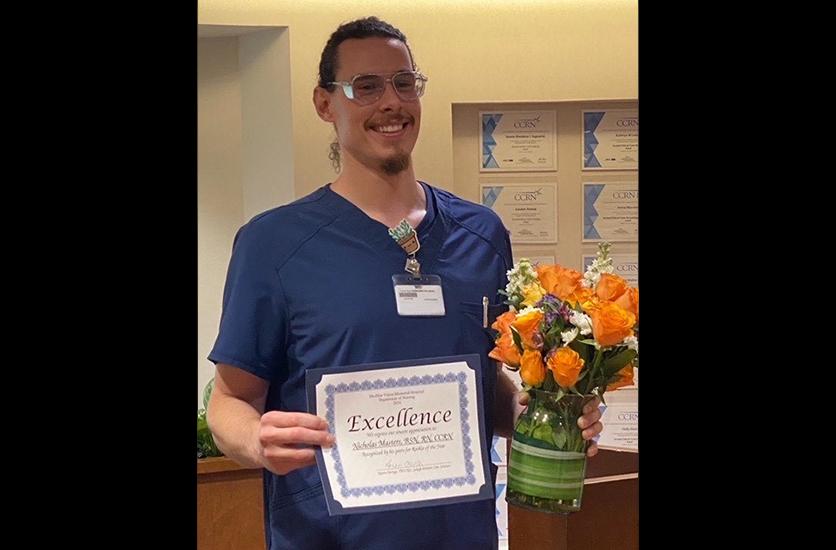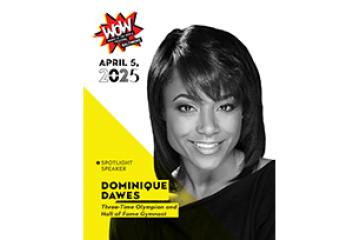ABSN Graduate Selected as Baltimore Hospital’s Rookie Nurse of the Year

By: Erik Pedersen, Content Strategy Director
BALTIMORE – A recent graduate of Notre Dame of Maryland University’s Accelerated 2nd Degree Bachelor of Science in Nursing (ABSN) program was honored as MedStar Union Memorial’s Rookie of the Year in recognition of his outstanding work in the hospital’s Critical Care Unit.
Nick Masters ’23 was presented with the award at a surprise ceremony during Nurses Week in May. He started his current role at MedStar Union Memorial in December 2022, four months after graduating from the School of Nursing’s ABSN program as a member of the August 2022 cohort.
“It’s always nice to be recognized for doing good work, and it’s extra special to know that the award was voted on by my peers,” Masters said. “It was certainly a big surprise to learn that I was selected. I’ve loved my time working at MedStar – the Critical Care Unit here is a perfect fit for me.”
After earning his initial bachelor’s degree in 2010, Masters spent two years in medical school before pivoting to other career interests. He was introduced to the nursing profession during a period working in elder care, and the School of Nursing’s emphasis on caring science had a strong influence on his ultimate decision to enroll at Notre Dame.
Learn more about Masters’ time at MedStar Union Memorial, his decision to become a nurse, and his experience as a student at NDMU:
As you approach two years in the profession, what have you liked most about being a nurse so far?
The thing that is most fulfilling for me is those little bits of feedback that you get which let you know you’re making a difference in someone’s life. Focusing on those moments offset the stress of having a busy night, or multiple busy nights in a row. Having that opportunity is what drew me into nursing.
I feel very involved and connected with my patients, and there is a lot to feel good about. Our unit has great nurses, and there is a team spirit and camaraderie where we don’t let people get inundated or feel like they don’t have help around them. That support really makes me enjoy working in this unit.
How has your career progressed during your time at MedStar?
I’ve started to take on more responsibilities recently. I’m part of a patient family education committee, which is responsible for distributing patient and family information for certain conditions that we deal with, including strokes, heart failure, and diabetes. There’s some community outreach associated with that committee as well.
I’ve also signed up for a preceptor class, so that I can start precepting new nurses to the unit. And I’ve learned how to do ultrasound guided IV insertions, which is kind of a niche thing for nurses in our hospital. There are a lot of opportunities to get involved with to make myself more valuable to the hospital.
Had you always intended to work in Critical Care? What drew you to that unit?
Critical care is an area of nursing where we are using our assessment and critical thinking skills on a regular basis. That really attracted me to that unit – it exposes me to all kinds of things that help me become a more competent and skilled nurse. It is great for professional growth. I had applied to a couple of different positions in the area, but this unit just felt like the best fit for me.
What was it that originally inspired you to become a nurse?
After earning my first bachelor’s degree, I actually went to medical school from 2012 to 2014. I didn’t finish. I loved the learning and the didactic instruction during the first few years, but once we got into the clinical rotations and the work flow, there was a disconnect from the patient that I didn’t expect. I found myself desiring a closer role in the patient’s care. I ended up taking time off and working a few different odd jobs. I did live sound production for many years. I got into home renovation and construction for a little bit. I eventually got into elder care, which became my introduction into nursing.
I really liked the educational aspect of elder care, which is pretty consistent with nursing. The patients that I worked with were mainly dealing with cognitive impairment rather than specific physical limitations. My role involved educating, being perceptive, and using judgment to positively help these folks get the most out of their lives. That’s when I started looking at going to nursing school.
What was your main takeaway from Notre Dame’s ABSN program?
The thing that made the biggest impact on me, and it was really refreshing to get this perspective, was the focus on caring science. The idea that there is more to patient care then just treating the numbers and following the algorithms. They put value on the art of nursing. As a nurse, my number one priority is the patient – making sure that they get the best possible outcome from their hospital stay.
It’s about paying attention to the small things: the emotions and perceptions of the patient, what is important to them, what they’re focused on during their hospital stay, and how I can use that information to make sure that I’m best educating them on how to deal with whatever illness or disease they have moving forward.
I think the caring science emphasis is something special to Notre Dame. I’m really thankful that they focused on that in addition to educating us on everything we would need to pass the NCLEX (National Council Licensure Examination). Our cohort learned several good nursing practices that I still use and remain mindful of. I’m certainly glad that I took the opportunity to attend Notre Dame.
Is there any message you’d like to pass along to current nursing students at Notre Dame?
When you get into the nursing profession, expect a lifelong learning process. Maintain the process of self-evaluation, and make sure that you’re staying sharp and up-to-date on the latest information. It’s certainly easy to feel intimidated by what stands before you – the workload, the responsibility – but it’s a really good feeling to be able to shoulder that, and know that you’re making an impact both for your patients and whatever institution you work for.
Established in 1895, Notre Dame of Maryland University (NDMU) is a private, Catholic institution in Baltimore, Maryland, with the mission to educate leaders to transform the world. Notre Dame has been named one of the best "Regional Universities North" by U.S. News & World Report.




